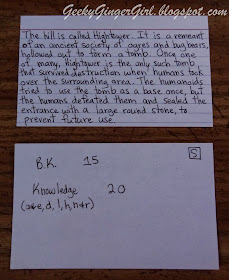 |
| My D&D binder and my beloved dice. <3 |
Imagine this: you're in the middle of a gaming session, and the party comes across some information that only one character would know/understand. For example, Draconic runes on the dungeon wall, a symbol that requires a Knowledge (Religion) check to know what it means, or a vital detail that only a high Gather Information roll could uncover. Whatever it is, only one of your characters has the appropriate knowledge, skill, or language, so that character would in essence have an important bit of information that the rest of the party wouldn't have. The problem is, as a DM, how do you convey that information to that character's player without the other players also finding out?
Most DM's I've gamed with had the same solution: they would just outright tell the player in front of the others, trusting the rest of us not to metagame and act like our characters knew the information too. But this usually resulted in the exact opposite response. Often we all role-played it out as if the well-informed character had already filled the rest of us in. We didn't intentionally metagame, but in that situation, it's sometimes hard not to.
Another solution I've seen used is to take the one player into a different room to tell them the information. This leaves the other players bored and in a bit of a limbo, waiting for the DM to get back. It usually works fine for the bigger, more important secrets, but it would be too inconvenient to use all the time.
So are you ready for my solution yet?
Info cards!
 |
| An example of some info cards my group received while playing through the "Dark and Stormy Knight" module. |
Here's how it works: When you're preparing for your next session, take a look at the material you expect to be covering (whether it's a pre-made adventure module or one you created yourself). Figure out what information might end up being revealed to only one character. Usually this would include things found out through Knowledge checks, speaking certain languages, and sometimes Gather Information checks. (I even like to include Spot/Listen checks sometimes, when I want the specific monster or villain's big reveal to be more dramatic.)
When you find a bit of information that fits the bill, write it down on an index card. Then flip the card over and on the back write the method of obtaining the information - skill check, language, whatever. On skill checks, make sure you note the minimum DC for obtaining the information. You can also write what room number or event number the card corresponds to, just to make it easier to find the relevant card at the right time.
During the session, have your characters make the required rolls as normal. If someone rolls high enough (or knows the necessary language), you just hand them the card. It's all mysterious. ;) Seriously though, the player who got the information feels important, and the other players are in suspense waiting to find out what's on the card.
As an added bonus, the player who has the information then gets to decide whether or not to share the information, depending on what his/her character would really do. In some cases the character really wouldn't share the information, would share only part of it, or would twist it to suit his/her own purposes. Giving the player a chance to do that really makes for some good opportunities for interesting role-play. And even if the player decided to tell all the information, just letting the character tell it his/her own way, and having the other characters react in-character, presents more great opportunities for role-play.
Got two different DCs for different amounts of information? No problem! Just write the lower DC info on one card and the higher DC on a different card. If the player beats the lower DC but misses the higher one, give the player only the lower DC card. If he/she beats both, hand over both! (Just make sure the cards are read in the correct order, if it matters.)
 |
| For example, if Aster the bard had rolled a 12 on his Bardic Knowledge check, he would've only gotten the information on the first card. |
It's as simple as that! Of course, if you're the fly-by-the-seat-of-your-pants, make-it-up-as-you-go, spontaneous type of DM, this probably won't work for you. But if that were the case, you probably wouldn't be reading tips for being an organized DM to begin with, now would you? ;)
If you missed my first tip, for using highlighters to organize campaign information, you can check it out here. Stay tuned for more tips soon, and leave a comment letting me know any tips of your own! Thanks for reading!
